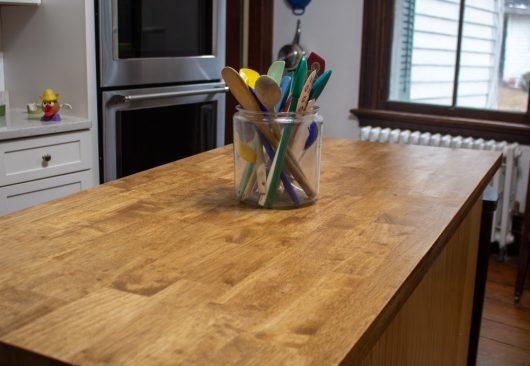 Today, just for fun, I’d like to show you how I clean and maintain my butcher block kitchen island. I purchased this food-prep station from an unfinished furniture store several years ago, and although it has seen its share of grease spatters and oil spills, it still looks handsome and new. And here, for the curious, is my regular butcher block care-routine:
Today, just for fun, I’d like to show you how I clean and maintain my butcher block kitchen island. I purchased this food-prep station from an unfinished furniture store several years ago, and although it has seen its share of grease spatters and oil spills, it still looks handsome and new. And here, for the curious, is my regular butcher block care-routine:
How to Seal New Butcher Block
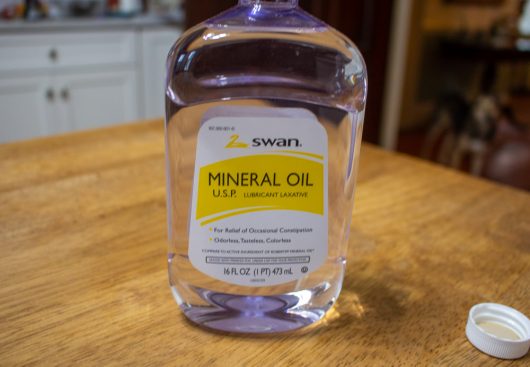 Butcher block is a porous material. Consequently it must be sealed against the ravages of moisture. I sealed my work station with food-grade mineral oil. This same oil can be found, for a song, in the “laxative” aisle of any two-bit drug store. Allow the oil to penetrate for 6 hours (or overnight) the first go-round. Then re-apply and let soak for just 30 minutes. Afterwards, wipe off any oil that has not been absorbed.
Butcher block is a porous material. Consequently it must be sealed against the ravages of moisture. I sealed my work station with food-grade mineral oil. This same oil can be found, for a song, in the “laxative” aisle of any two-bit drug store. Allow the oil to penetrate for 6 hours (or overnight) the first go-round. Then re-apply and let soak for just 30 minutes. Afterwards, wipe off any oil that has not been absorbed.
Regular Care
 If you cook as enthusiastically as I do, your butcher block will take quite a beating. I use separate cutting boards — not my work surface! — to chop meats and vegetables. Still, I routinely litter the block with red wine, molasses, cooking oil, and you-name-it. Liquids do no penetrate the sealed wood. They just leave a sticky mess. I clean the surface this way:
If you cook as enthusiastically as I do, your butcher block will take quite a beating. I use separate cutting boards — not my work surface! — to chop meats and vegetables. Still, I routinely litter the block with red wine, molasses, cooking oil, and you-name-it. Liquids do no penetrate the sealed wood. They just leave a sticky mess. I clean the surface this way:
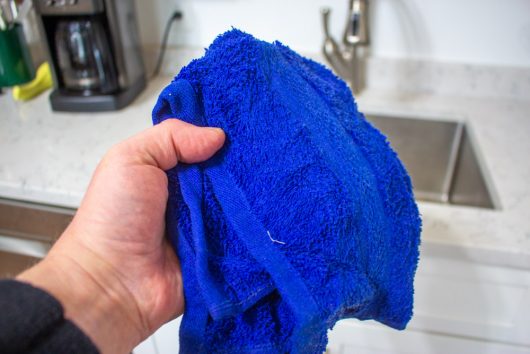 First, grab a kitchen towel — terry cloth works best here — and dampen it with plain water.
First, grab a kitchen towel — terry cloth works best here — and dampen it with plain water.
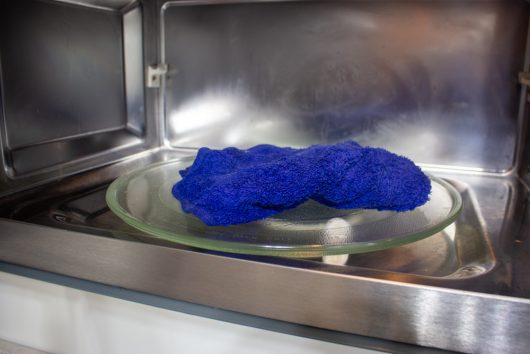 Heat the towel in the microwave for 90 seconds.
Heat the towel in the microwave for 90 seconds.
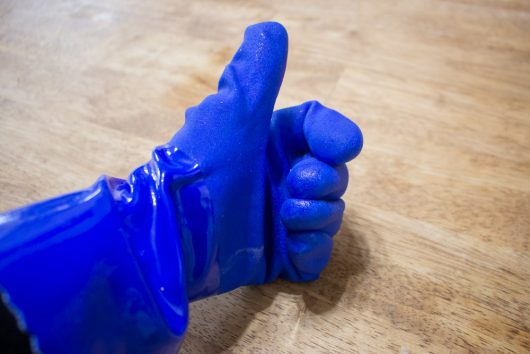 Also, grab some heavy-duty gloves (“Blu-ettes” for me), because the aforementioned towel is gonna be hotter than a two dollar pistol.
Also, grab some heavy-duty gloves (“Blu-ettes” for me), because the aforementioned towel is gonna be hotter than a two dollar pistol.
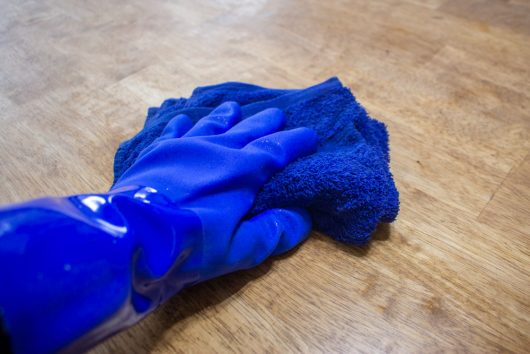 As you wipe down the butcher block, the hot towel will quickly dissolve and dislodge any food particles that have stuck to the surface. (I use this same hot-towel trick to dissolve grease that clings to my kitchen cabinets.)
As you wipe down the butcher block, the hot towel will quickly dissolve and dislodge any food particles that have stuck to the surface. (I use this same hot-towel trick to dissolve grease that clings to my kitchen cabinets.)
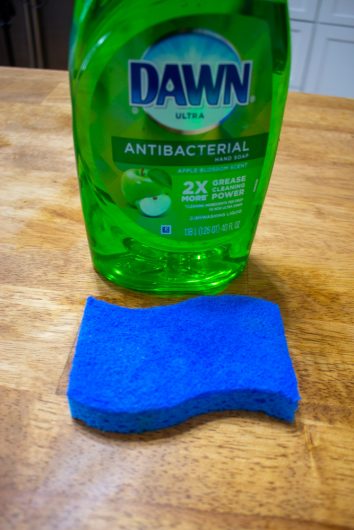 To remove superficial grease stains, dampen a non-scratch Scotch Brite pad with water and a little dish washing detergent.
To remove superficial grease stains, dampen a non-scratch Scotch Brite pad with water and a little dish washing detergent.
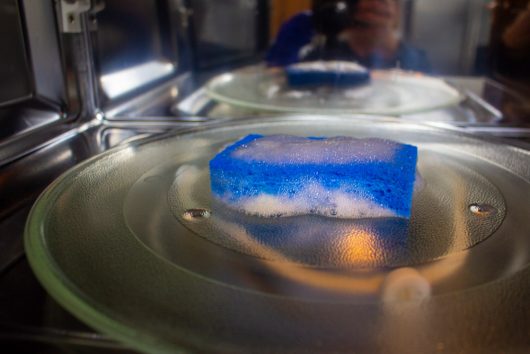 Heat the pad in the microwave for just 30 seconds. As the pad spins round and round, hot bubbles will emerge.
Heat the pad in the microwave for just 30 seconds. As the pad spins round and round, hot bubbles will emerge.
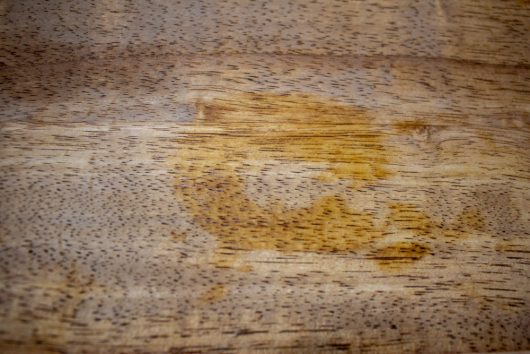 Locate the grease stains…
Locate the grease stains…
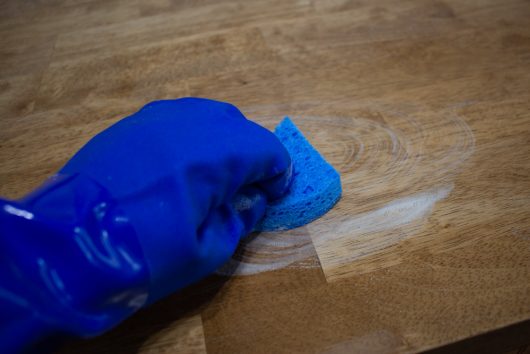 And go to town with the hot, soapy pad.
And go to town with the hot, soapy pad.
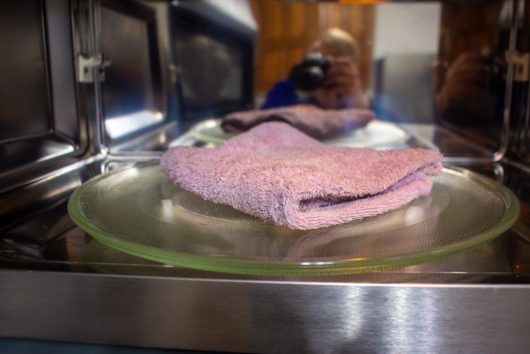 Promptly rinse the soap with a clean, damp terry cloth towel that has been heated for 90 seconds in the microwave oven.
Promptly rinse the soap with a clean, damp terry cloth towel that has been heated for 90 seconds in the microwave oven.
Note: I have two reasons for microwaving my cleaning towels and pads. First, the heated gadgets clean extra-efficiently, and with only minimal scrubbing. And next; hot water rapidly evaporates from wood surfaces. It’s never a good idea to let water stand on wood for any length of time.
Another note: I’ve read that deep stains can be removed from butcher block with a brisk rub of lemon juice and coarse salt. Since I’ve not tried this trick myself, I can not vouch for its effectiveness.
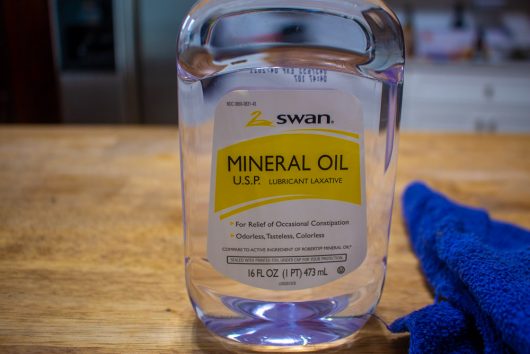 My work surface receives a fresh seal of food-grade mineral oil once a month or so. Oiling is easy to do:
My work surface receives a fresh seal of food-grade mineral oil once a month or so. Oiling is easy to do:
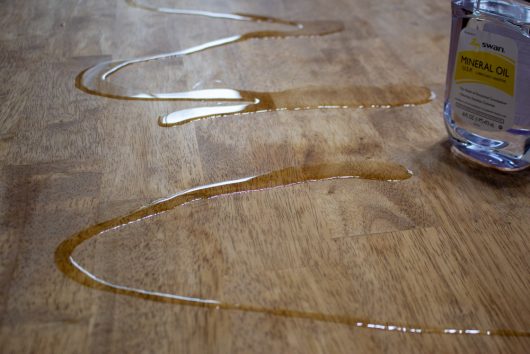 First, clean the wood as described above, and let it dry completely. Then squirt a generous amount of food grade mineral oil onto the wood.
First, clean the wood as described above, and let it dry completely. Then squirt a generous amount of food grade mineral oil onto the wood.
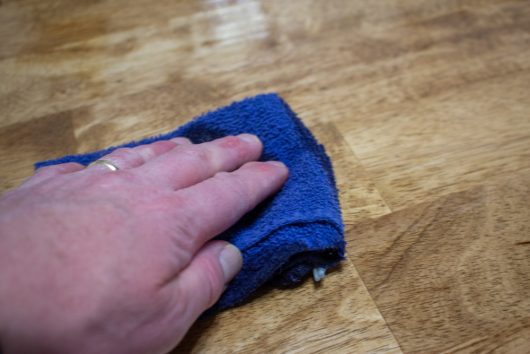 Use a clean terry cloth or rag to spread the oil all over the surface of the block…
Use a clean terry cloth or rag to spread the oil all over the surface of the block…
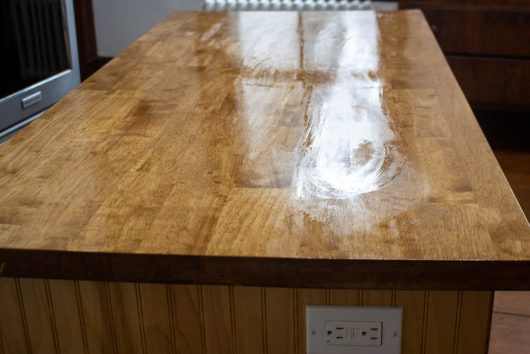 And let it stand for 30 minutes. Then wipe off excess oil, and let permit the butcher block to dry for several hours or overnight.
And let it stand for 30 minutes. Then wipe off excess oil, and let permit the butcher block to dry for several hours or overnight.
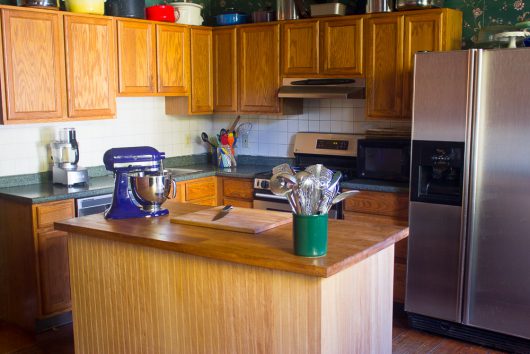 How much do I love my butcher block work station? Well, when my kitchen received a make-over in 2018, in which new cabinets and counter tops were installed…
How much do I love my butcher block work station? Well, when my kitchen received a make-over in 2018, in which new cabinets and counter tops were installed…
 I refused to give up the butcher block island! You see, butcher block is very forgiving. Should a glass spice jar to fall on my new Stilestone counter, I’d have to clean up a million shards of glass. The same jar when banged against butcher block? No problem. Butcher block is a very gentle surface for the accident-prone.
I refused to give up the butcher block island! You see, butcher block is very forgiving. Should a glass spice jar to fall on my new Stilestone counter, I’d have to clean up a million shards of glass. The same jar when banged against butcher block? No problem. Butcher block is a very gentle surface for the accident-prone.
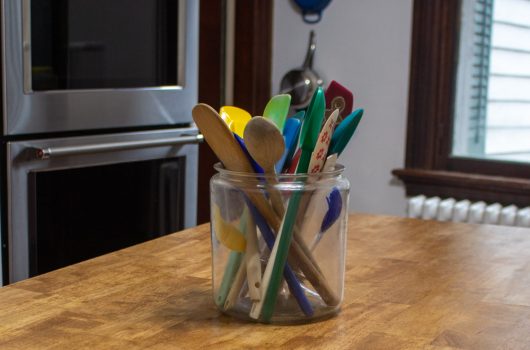 Well. Thank you for spending time with me today. If you have any butcher block cleaning tips of your own, please shout ’em out in the comments field below! xKevin
Well. Thank you for spending time with me today. If you have any butcher block cleaning tips of your own, please shout ’em out in the comments field below! xKevin
 Hungry for more? Get my email updates and subscribe to my YouTube channel.
Hungry for more? Get my email updates and subscribe to my YouTube channel.

joanne Folstad says
Oh Kevin. Yes, mineral oil was used previously as a laxative. My mother even made “diet” salad dressings with it, but no more! Mineral oil is carcinogenic! On a frequently used work surface like your butcher block there is no reason not to use a plain vegetable oil corn or canola oil. Please do that and be safer. As often as you will be wiping down your wood surface there will be no danger of the veg oil getting stale or rancid.
Juliana says
I love your practical posts! I don’t have butcher block, but I do have wooden spatulas and spoons that need some care. Thanks!
Mina Kerr says
Industrial-use mineral oil is definitely a carcinogenic. But that oil is very different from food grade or more highly refined mineral oils. Do your own research and decide on the risk to your health.
Maraya says
Thanks for the hot towel tip for cabinets. What a great idea!
Jacquie Guest says
Hi Kevin,
I have used Wood Wax products on my butcher block, such as Clapham’s Beeswax Salad Bowl Finish. Wondering if I am setting myself up for a world or work scraping it off so that I can use mineral oil instead?
elaine says
Your kitchen is SO gorgeous! Thanks for the hot towel tip. Health dept made us use diluted bleach/water mix on the cutting board, followed with food grade mineral oil. Plain old canola oil and vegetable oils go rancid with time. I’ve used *food grade* mineral oil for years on my kitchen woods.
Kevin Lee Jacobs says
Hi Jacquie – From what I’ve read, Clapman’s Salad Bowl Finish contains mineral oil in addition to beeswax. Sounds like a good product!
Virginia Spencer says
I have a butcher block portable piece that I bought to use in my 5th wheel trailer and it has rubber feet to keep it from moving around and sits on top of the stove cover. I have never used it because I did not know how to care for it. Your demonstration has really helped me and now I will use it on that butcher block and have full use of it. I am also going to use it on the cupboard faces in the trailer also. It will give it more life. Thanks for the demonstration Kevin. I love your posts!
Janis says
I have an Edison ‘Little Folks’ platform high chair from the 50’s. It is all solid hardwood. The chair and platform are white, the tray is natural wood. The tray gets the same treatment you use on your butcher block. This high chair was mine, used by myself and my brother and sister. My children used it when they were babies and now my grand niece. At 70 years old it still looks like brand new. It is really beautiful. Your butcher block will last for decades.
Anne Beckes says
Kevin: what is the best way to clean a knife block?
Michelle Wilhelms says
Another tip – If your block has a lot of build up, (food, oils,etc) slice a lemon in half and rub the open side on the block. Carefully use a plastic scraper or putty knife to scrape up the goop. It’s amazing how much there might be. Wipe it down well with a paper towel. Once dry and clean, use a thin covering of food grade mineral oil or a mix of bees wax and mineral oil to seal it. Wipe off any excess. Food oils like olive can go rancid over time.
Kay Crichton says
Since I do the same process on my cutting boards I want to tell you something else. Your sweet dog has the same sweetheart face as one of the best dogs we ever had. He was an abused stray that was dumped at our house on one Christmas Eve and was the best Christmas present ever. Pet your sweetheart for me!
Carol says
Hi everyone – I have a narrow butcher block countertop that has some “rust rings” from a few canned goods sitting there way too long (prob r/t steam from the nearby microwave). Any idea how to remove? TY!
patrice caden says
thanks for this timely information. Time to clean the butcher block. Txs